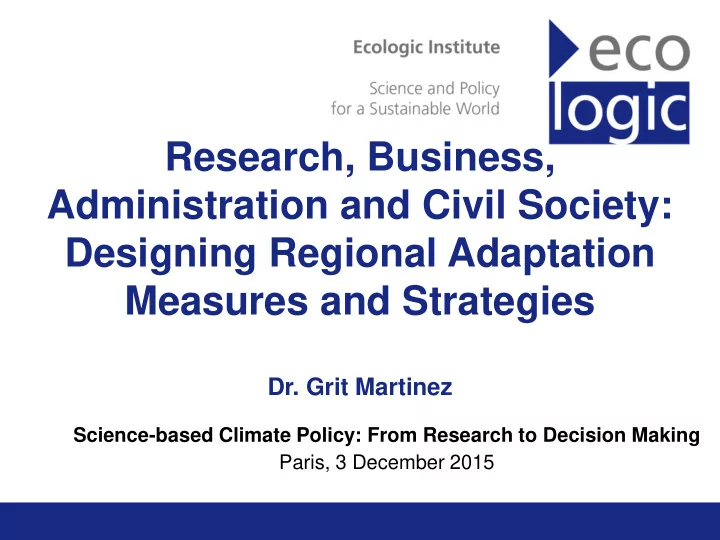

Ecologic Institute ecologic.eu Research, Business, Administration and Civil Society: Designing Regional Adaptation Measures and Strategies Dr. Grit Martinez Science-based Climate Policy: From Research to Decision Making Paris, 3 December 2015
Ecologic Institute ecologic.eu Agenda Historical Development of Climate Change Research and Policy Making Observations from the Applied Research Initiative KLIMZUG Conclusion
Ecologic Institute ecologic.eu Development in numbers of scientific publications addressing “Climate Change” Source: IPCC AR5, WG II report, p. 173
Ecologic Institute ecologic.eu Development in numbers of scientific publications addressing “Climate Change” and “...” Source: IPCC AR5, WG II report, p. 173
Ecologic Institute ecologic.eu Development of climate policy and climate research from 1990... World IPCC SAR IPCC TAR IPCC FAR Rio Summit UNFCCC UNFCCC: UNFCCC comes Marrakesh into force Accords Europe UKCIP Germany PIK 2001 1990 1992 1994 1995 1997
Ecologic Institute ecologic.eu ... to today World IPCC AR4 IPCC AR5 UNFCCC: UNFCCC: UNFCCC: UNFCCC: Buenos Aires Cancún Paris Nairobi Work programme of Adaptation Agreement? Programme work Framework Europe EU EU-Green EU- Adaptation book Whitebook Finnish Strategy Adaptation UK Climate Strategy Change Act DAS Germany KomPass DAS APA Progress Report klimazwei, KLIMZUG CSC SGA KLIWAS, KlimaMORO, KlimaExWost 2004 2005 2006 2007 2008 2009 2010 2011 2012 2013 2014 2015
Ecologic Institute ecologic.eu L. Tiepolt, StALU-MM Eurimage 2003, Common Wadden Sea Secretariat rowan, Photocase H. Schobert, ZALF Emschergenossenschaft/Lippeverband B. Sieg, Universität Kassel Landeshauptstadt Dresden
Ecologic Institute ecologic.eu IPCC is a global answer; impacts, stakeholders and actions are local Humans are not primarily creatures of rational deliberation, but rather habit, and learn best from personal experience What to do? Attribution Analysis – Ascertain mechanisms capable for changes/actions understandable, small-scale, relevant, regionally applicable, gains, political support mechanism, collaborations
Ecologic Institute ecologic.eu How did RADOST foster collaborations? Transfer of climate knowledge within regions Selection of partners from the fields of Business, Administration and Civil Society for the implementation of 15 projects Development of solutions with practitioners International exchange on the community level (Europe, North America, Asia)
Ecologic Institute ecologic.eu Some examples of measures and strategies Coastal protection: Combining coastal protection constructions with tourism activities; counseling for the city of Rostock Tourism industry: Bay of Kiel Alliance (19 communities in the Bay of Kiel set up measures autonomously to support tourism industry); Concepts for aquaculture industry in the marina of Kiel; Geothermal energy for beach utilization Port industry : Integrating marine environmental data into route-specific optimization of ship design Agricultural industry : Reduction of nutrients inputs through retention ponds
Ecologic Institute ecologic.eu Conclusion Climate Research shall be: regionally applicable (for and with stakeholders), combining arguments and solutions qualitative data - habits, values, perceptions and motivations shall be collected in ways that try to maximize validity (relevance and accuracy for stakeholders) and complement quantitative climate data basis support for implementation projects alongside the research agenda is highly desirable
Ecologic Institute ecologic.eu Thank you! Dr. Grit Martinez Science-based Climate Policy: From Research to Decision Making Paris, 3 December 2015
Recommend
More recommend